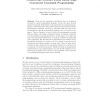23 search results - page 3 / 5 » On Avoiding Redundancy in Inductive Logic Programming |
IJCAI
1993
15 years 1 months ago
1993
We study multiple predicate learning in an empirical setting. Problems with existing inductive logic programming approaches in this setting are sketched and an empirical ILP syste...
FSTTCS
2007
Springer
15 years 6 months ago
2007
Springer
There are two somewhat contradictory ways of looking at modules in a given programming language. On the one hand, module systems are largely independent of the particulars of progr...
122
click to vote
ENTCS
2002
15 years 3 days ago
2002
We present a declarative debugger for lazy functional logic programs with polymorphic type discipline. Whenever a computed answer is considered wrong by the user (error symptom), ...
ECAI
2000
Springer
15 years 4 months ago
2000
Springer
A number of Inductive Logic Programming (ILP) systems have addressed the problem of learning First Order Logic (FOL) discriminant definitions by first reformulating the FOL lear...
103
click to vote
POPL
2010
ACM
15 years 15 days ago
2010
ACM
In this paper, we explore the potential of the theory of nested words for partial correctness proofs of recursive programs. Our conceptual contribution is a simple framework that ...

